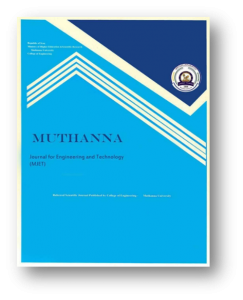MUTHANNA JOURNAL OF ENGINEERING AND TECHNOLOGY (MJET)
Research Article:
Forat Yasir AlJaberi a* , Wadood T. Mohammedb
a Chemical Engineering Department, Engineering College, AL Muthanna University , Iraq.
b Chemical Engineering Department, Engineering College, University of Baghdad
E-mail addresses: furat_yasir@yahoo.com
ABSTRACT
The aim of the present work is to analyze the phenomenon of electrodes consumption (i.e. anode and cathode electrodes) when it used in a batch electrocoagulation reactor for the removal of lead from a synthesis wastewater. The studied operational parameters were the electrolysis time (5-60) minute, pH value (2-12), applied current (0.2-2.6)Amperes, and the initial concentration of lead and the stirring speed were fixed at 155ppm and 150rpm respectively. Aluminum concentric tubes were used as electrodes by making the outer and inner as the anode electrode and the rest in between as the cathode electrode. Statistica-10 and Minitab-17 statistical programs were used to analyze responses via response surface methodology (RSM) technique to find the correlations that relate to all variables. The results show that both of electrodes had consumed and increased or decreased in that way belong to the operating variables. Applied current and pH value of the simulated solution were founded as the main effect of electrode consumption.
